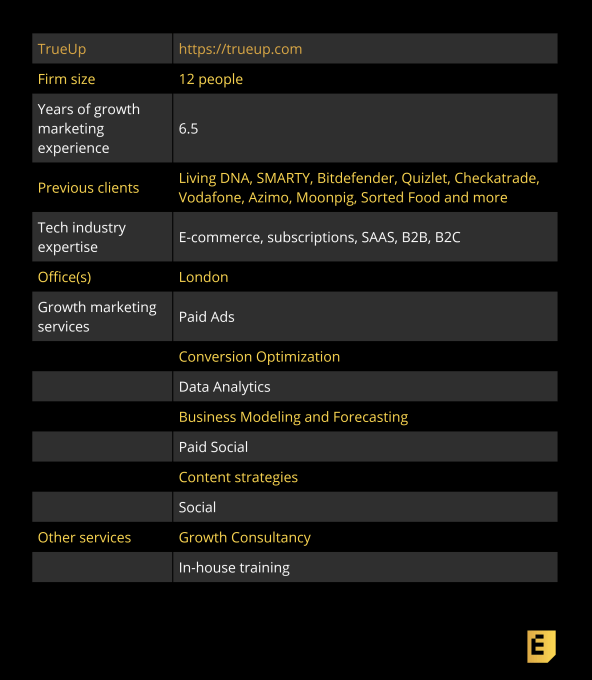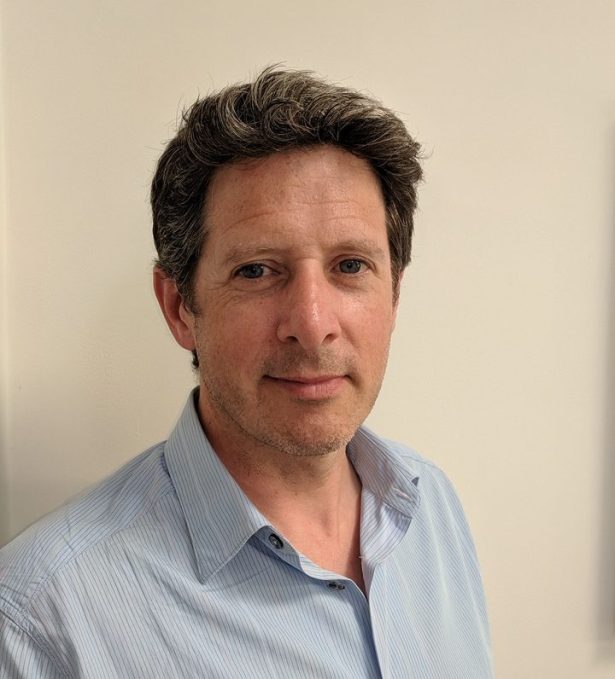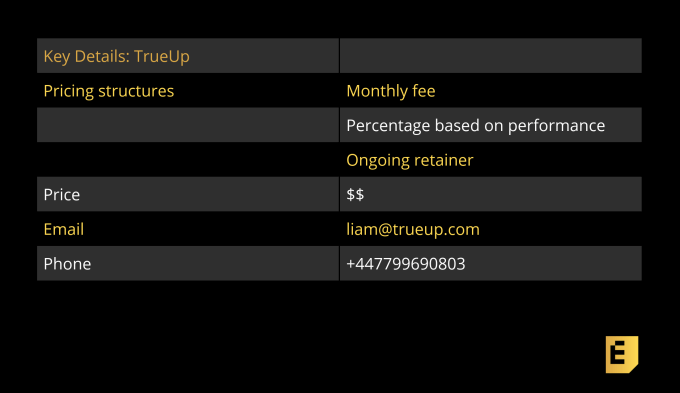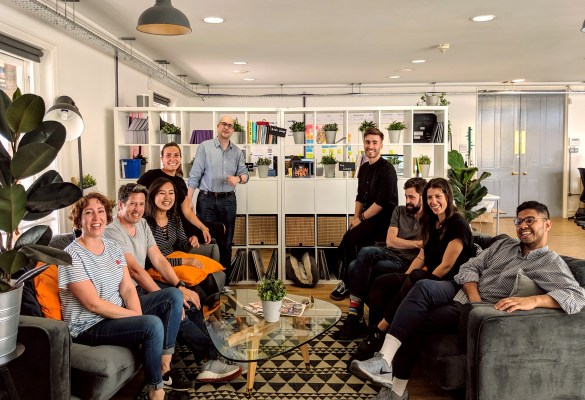It was the perfect storm when CEO and Founder Liam Reynolds finally decided to start TrueUp, a data-driven growth marketing agency/consultancy based in London. After decades of working for large creative advertising agencies, Liam quit his job right around the beginning of Silicon Valley’s growth hacking trend and plunged headfirst into running growth for early-stage startups.
TrueUp has since evolved from a one-man shop into an award-winning agency with a team of dedicated data, paid marketing and conversion specialists. Learn more about how they collaborate with clients and help them develop short- and long-term growth frameworks.
TrueUp’s approach to growth marketing:
“Rather than just saying ‘Look at these amazing results we’ve achieved,’ we would say, ‘Look, these are your growth opportunities, this is the process you need and here’s the framework unlock your true potential,’ We would build business models around this to show the opportunity in numbers, revenue and ROI.
Our approach to growth is anchored in delivering the right message to the right target audience in the right channel at the right time. It sounds simple but we’re amazed at how wrong people get this.
So we’ve created our own bespoke methodologies and frameworks to really explore and identify these hidden killer messages that drive action. We’ve built our own tools that allow us to do a lot of high-tempo, high-intensity testing.
It’s quite common that we have 500 to 600 tests running concurrently on Facebook for any given client. We’re continuously testing, learning, iterating, improving. As a result we’ve achieved some amazing results for our clients.”
Advice to founders:
“We approached True Up to help us establish and scale a UK paid marketing function. The team was highly professional from their initial pitch through the end of the project.” Maninder Saini, SF, International Operations Manager, Quizlet, Inc.
“For earlier stage startups, it’s to focus on achieving product-market fit and having awesome user experiences before worrying about growth. We worked with and mentored a lot of startups that immediately jump to, “Look I need to get X number of customers in X months.” However their products/services are often seriously lacking. This creates very weak foundations for growth. So their efforts would be better spent on creating products that genuinely meet a customer need. Once they’ve achieved product-market fit, it’s to communicate benefits not features. There’s always at least one killer message that cuts through but more often than not it’s hidden and not what the founders think it is. So a structured test program to explore this is also very much needed!”

Below, you’ll find the rest of the founder reviews, the full interview, and more details like pricing and fee structures. This profile is part of our ongoing series covering startup growth marketing agencies with whom founders love to work, based on this survey and our own research. The survey is open indefinitely, so please fill it out if you haven’t already.
Interview with TrueUp CEO & Founder Liam Reynolds

Yvonne Leow: Tell me about how you got into growth marketing and why you decided to start TrueUp.
Liam Reynolds: I started my career at a data marketing company called Dunnhumby. They were famous for managing the data science and intelligence behind TESCO’s Club Card, a very large loyalty program in the UK.
Here I learned the importance of data, targeting, segmentation and testing that has remained with me ever since. I then spent about 12 years working for big marketing and advertising agencies like Omnicom and the Engine Group. This gave me a much wider context to marketing and all the different disciplines.
TrueUp was set up initially as a direct result of working in creative advertising agencies. As a data guy, I wanted to create something where there was a tangible and measurable outcome to the marketing.
My previous world was ‘Has your campaign won awards?’, ‘have you been featured in the marketing press’ or ‘can I show my parents our ad on TV?’. I wanted to create a new world that was ‘How much have we spent?’, ‘how many customers & revenue has it generated?’, ‘What have we learned?’ and ‘what should we do next?’
This fortunately coincided with the early-stage growth hacking trend, and I finally decided to set up TrueUp. At the time we were the first UK growth hacking agency and one of only 4 worldwide.
I went headfirst into London’s tech scene and also figuring out how companies at the time like Groupon, Dropbox and Airbnb were scaling without using traditional marketing agencies. We ended up creating our own philosophies to growth and accompanying approaches, processes and frameworks.
The art & science of testing, learning and iterating at speed was really key in us figuring out how to help companies grow. We ended up mentoring countless startups at Telefonica’s accelerator WAYRA where we learned a lot about what works, what doesn’t and why. Since then we’ve worked with startups, but also larger corporates such as Vodafone, Telefonica, The Economist & Standard Life who wanted to be more ‘startup’, lean and agile in their marketing.
Yvonne Leow: What’s TrueUp’s approach to growth marketing?
Liam Reynolds: We realized early on that most of our clients wanted customer acquisition and fast. They wanted to see immediate results. So we initially focussed on paid media customer acquisition through Facebook and Google. But we recognized that if CPAs are the end goal, then media is only half the equation. The second half is the post-click user journey and conversion funnel. We then built out our web optimization, A/B testing, app store optimization offering, and by controlling both the pre- and post-click user experience, we were able to get much better CPAs than focussing on just the media.
Eventually we asked ourselves, “Okay, how can we get even better results?” We ended up taking a data-centric approach, using numbers to model our clients’ businesses and create ‘what if’ scenario planning tools. These showed where the biggest quick win opportunities were and what sort of investment was needed to unlock them.
We already knew that a lot of the value we bring clients is the ability to test and experiment at speed. So we started looking at how we could do more and more tests. Facebook and Google weren’t exactly setup to facilitate this, so we ended up building our own tools to help achieve this. We ended up carefully structuring experiments where we run hundreds and hundreds of tests simultaneously. We then learn what overall message works, who the core target segments are, what message works within each segment and what the overall opportunity is for those specific channels (Facebook, Instagram, Google Search, Display, LinkedIn, etc). We then use those learnings and apply to other channels such as the website and ensure those user journeys are fully optimized and working as hard as humanly possible.

Yvonne Leow: How is TrueUp structured as an agency? What kind of expertise do you have on your team?
Liam Reynolds: We operate as both a consultancy helping clients identify where their opportunities are and what’s needed to unlock them but also as an agency to execute on them. We flex around our clients’ capabilities but can run the entire process if needed.
Our team includes experts who know the key platforms inside out (Facebook, Instagram, Google, etc), data analytics, design, UX, CRO & strategy. As a collective, we’re quite T-shaped, so rather than having a team of generalists, we’ve got a group of dedicated specialists but who come together and create a growth-orientated approach.
Yvonne Leow: If I were a founder, how would I know whether or not TrueUp is a good fit for my company? What kind of clients are you looking for?
Liam Reynolds: Early-stage startups probably aren’t the right fit for us. In part, because of our fees and our need to work with companies that can already evidence product-market fit.
Today, our clients are quite diverse in that there’s a mix of startups and corporations. They all have a proven business model and the challenge is one of growth and scale. More importantly is their attitude, whether they want to be brave, do things differently, be experimental and push boundaries. We also love companies that share aren’t afraid to fail some of the time.
Yvonne Leow: What questions would you ask potential clients to see whether they share the same attitude towards growth?
Liam Reynolds: We usually ask:
- Where is their business currently? Specifically asking them to share some key stats around customer numbers, revenue, sales, downloads, web traffic etc.
- What are the key KPIs such as CPAs and lifetime value?
- What’s their current marketing strategy? We want to get an idea of their sophistication.
- What are their main challenges? This helps us understand where they think they need help.
- What’s their intended spend over the next three to six months? This gives a good indication on how serious they are.
- What are their goals and ambitions? We want to know what they want to achieve in terms of growth in the short term and long term. We use this as a feasibility test to see how realistic their expectations are.
We would then delve deep into the product, why they built it, about their customers and future plans. We’ve worked with enough companies over the years to know whether we can genuinely help or not.
Yvonne Leow: Awesome. Say we agree to work with one another, what’s next?
Liam Reynolds: We usually start work on a three to four-month pilot basis, where we want to prove to you how good we are by showing an awesome set of results and some killer insights. The first month involves us doing a deep dive into your business.
We have various processes and procedures that help us get up to speed. We meet your team, have workshops to understand your business process, we give analysts access to the analytic tools so understand your numbers. Then, we do an audit on existing marketing activity and see how good they’re performing.
We would then typically dive into a two to three-month pilot run, which might, for instance, involve a Facebook campaign. As part of that we would develop a messaging platform, which is a way of understanding all the different proof points and messages that convey why users should be interested in your product/service rather than your competitors. We go into a pretty intense testing phase to break down your different target audiences and explore what messages work against them.
After doing that for a couple of months, we should come back to you with three things. One is evidence we’ve decreased your CPA’s by 50%. Secondly, we share a whole wealth of insights about who your customers are, what messages they’re responding to, and how that differs based on different segments. And finally we show you the longer-term opportunity over the next 12 months with a revenue forecast.
Yvonne Leow: Got it. What is your fee and payment structure for clients?
Liam Reynolds: We either work on a project basis. A typical project would be for four months and cost somewhere between £20k to maybe £60K pounds, sometimes more. After that, we settle into a £5 to £30K pound monthly retainer, which varies depending on the size of the client, the scale of the business, and agreed scope.
With some of our clients, we go into a performance-related agreement where we put a percentage of our fee at risk, based on hitting a certain number of KPI’s. If we achieve it, there’s usually an upside for us so we’re closely aligned with our client’s objectives.
Yvonne Leow: What mistakes do you often see your clients make when it comes to growth marketing?
Liam Reynolds: There are a number of common mistakes we see. Having tried something once, it not working and therefore totally dismissing it is common. Not knowing your target audience or having a clear value proposition for them is happens a lot.
Being hooked to certain channels without fully understanding the impact they have e.g. through multi-touch attribution happens a lot with scale-ups. My favorite is prioritization, too many times we see clients focussing on the wrong thing and now knowing what’s really driving the business and therefore what to focus on. Rarely is the right answer to build out more product features.
Founder Recommendations
“TrueUp worked together with us to deliver efficient profitable growth marketing in a crowded DNA testing space from production proposition, CRO to ads and channel optimization. End-to-end cycle. They’re like your in-house growth team working side-by-side.” – David Nicholson, UK/USA, Co-Founder, Living DNA.
“TrueUp were brilliant in presenting a completely new approach to testing top of funnel message effectiveness. They helped us test real customer behavior, and bold messages, without risking our brand. This has transformed our view of what customers value in our product, which has led to a step-change in conversion in our pilots.” – Head of Proposition Innovation in Edinburgh, UK
“Having worked with other growth hacking agencies and individuals, we were quite skeptical of the some of the promises TrueUp made. However having worked with them now for 4 years, they’ve obviously proved themselves! They help us with both company and candidate acquisition for our tech jobs fairs, optimizing every part of our acquisition funnel. In particular they ran a lot of ads as tests to find which message messages work best with different target audiences. I think at one point we had 500+ individual tests live on Facebook alone. Importantly for us, they reduced our CPA so played a vital role in our success. They were also lovely guys to work with. The team was so entwined with our businesses that they genuinely felt like an extension of our team. They’re highly recommended! – Laura Jones, London, New York and Austin, Co-Founder, Silicon Milkroundabout and The Round
“We approached True Up to help us establish and scale a UK paid marketing function. The team was highly professional from their initial pitch through the end of the project. They had an incredibly intuitive understanding of how they would fit well into our organizational structure and how best to add value as an external growth marketing agency which made our lives a lot easier. We spun up paid marketing campaigns across platforms and the TrueUp team followed a clear, concise, and scientific process for testing and improving our campaigns. The end result was a huge gain in understanding PPC, better CPAs than we originally anticipated, and great user growth with solid engagement. We ended up taking a ton of their best practices and workflows in house for our own teams.” – Maninder Saini, SF, International Operations Manager, Quizlet, Inc.
